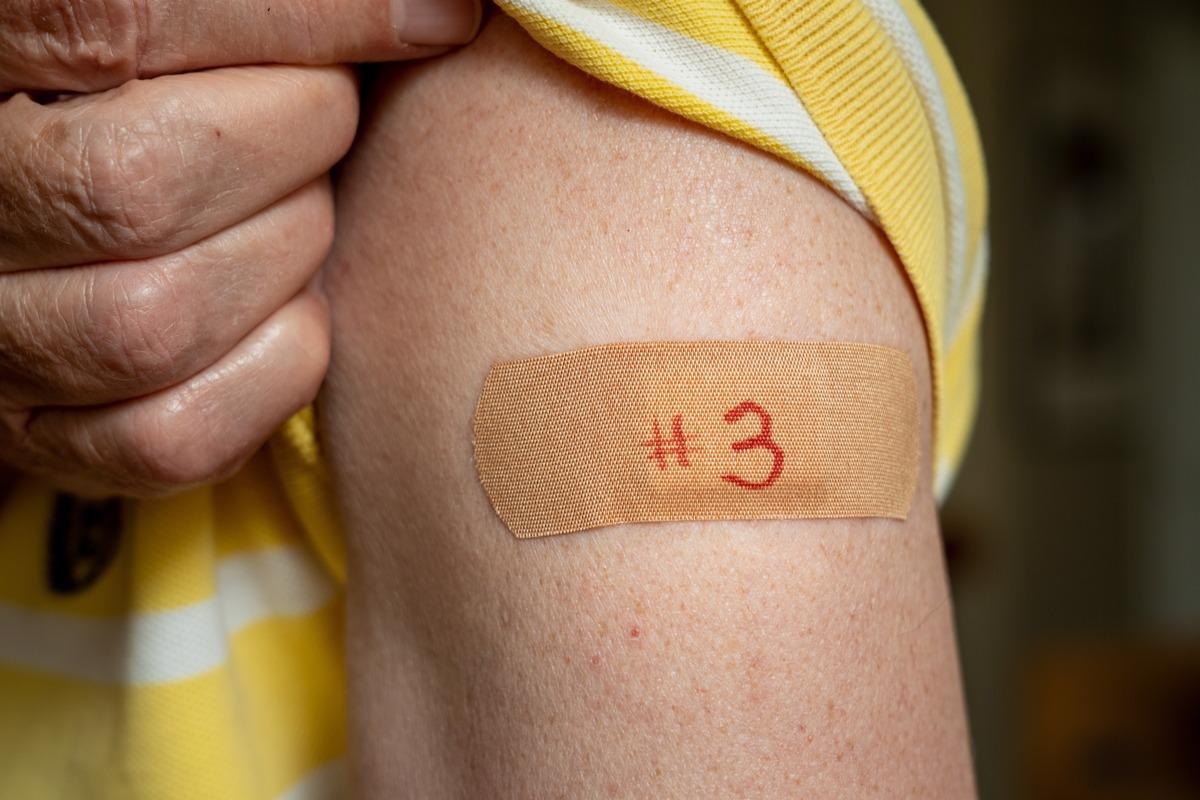mRNA booster vaccination shown to induce robust neutralizing antibodies against SARS-CoV-2 omicron variant

Scientists recently assessed the immunogenicity of a third booster dose of coronavirus disease 2019 (COVID-19) vaccines against severe acute respiratory syndrome coronavirus 2 (SARS-CoV-2) variants. The findings indicate that a booster immunization with mRNA COVID-19 vaccines induces robust antibody responses against the omicron variant in individuals primed with two doses of either mRNA or inactivated virus vaccines. The study is currently available on Preprints with The Lancet*.
 Study: Homologous or Heterologous mRNA Booster Vaccination Induces Robust Neutralizing Antibody Responses Against SARS-CoV2 Omicron Variant in Individuals Receiving mRNA or Inactivated Virus Priming Vaccination. Image Credit: Steve Heap/Shutterstock
Study: Homologous or Heterologous mRNA Booster Vaccination Induces Robust Neutralizing Antibody Responses Against SARS-CoV2 Omicron Variant in Individuals Receiving mRNA or Inactivated Virus Priming Vaccination. Image Credit: Steve Heap/Shutterstock
Background
With the progression of the COVID-19 pandemic, many vaccines have been made in record time and speed to mitigate the transmission of SARS-CoV-2. These vaccines have shown high efficacy in preventing infection and severe disease in both clinical trials and real-world studies. However, with the emergence of new viral variants, a reduction in vaccine efficacy has been observed worldwide. Many countries have started immunizing the at-risk population with a third booster vaccine dose to improve the efficacy of vaccines, particularly against highly immune evading variants, including the beta, delta, and omicron.
In Singapore, three vaccines have been listed in the National Vaccine Program, including mRNA vaccines BNT162b2 (Pfizer-BioNTech) and mRNA-1273 (Moderna) and inactivated virus vaccine CoronaVac (Sinovac). Regarding booster vaccination, the country has adopted both homologous (same vaccines for prime-boosting) and heterologous (different vaccines for prime-boosting) strategies to immunize at-risk populations.
In the current study, scientists evaluated the neutralizing efficacy of COVID-19 booster vaccination against wild-type SARS-CoV-2 and delta and omicron variants.
Study design
The study was conducted on four different groups of individuals. In two homologous groups, participants were primed with two doses of either mRNA-based or inactivated virus COVID-19 vaccine, followed by mRNA booster vaccination or inactivated virus booster vaccination, respectively. In two heterologous groups, participants were primed with two doses of either mRNA-based or inactivated virus COVID-19 vaccine, followed by inactivated virus booster vaccination or mRNA booster vaccination, respectively. Each participant received two prime vaccinations at an interval of 21 days.
The plasma levels of omicron spike receptor-binding domain (RBD)-specific binding and neutralizing antibodies were measured and compared with wild-type RBD- and delta RBD-specific antibodies. In addition, the frequencies of omicron RBD-specific B cells were assessed in the peripheral blood samples.
Important observations
The analysis of plasma antibodies revealed that participants who received three mRNA vaccine doses have significantly higher levels of IgG-specific anti-omicron RBD antibodies compared to participants who received three doses of inactivated virus vaccine. Regarding IgG1-specific anti-omicron RBD antibodies, 15-fold higher levels were observed in participants with mRNA booster vaccination than those with inactivated virus booster vaccination. IgG1 antibodies comprise about 60 – 70% of all IgG antibodies in the human plasma and play vital roles in preventing viral and bacterial infections.
Regarding neutralizing antibodies, the mRNA booster vaccination caused the highest induction in neutralizing titers against the wild-type virus and delta variant in participants who were primed with mRNA or inactivated virus vaccination.
Regarding the omicron variant, poor neutralizing titers were detected in participants who received only two doses of mRNA or inactivated virus vaccine. The highest induction in neutralizing titers against the omicron variant was observed in participants who received the mRNA booster vaccination, irrespective of the type of prime vaccination. In contrast, no significant induction in anti-omicron neutralizing titers was observed after inactivated virus booster vaccination.
Regarding omicron RBD-specific B cells, the highest frequencies were observed in participants who received the mRNA booster vaccination, irrespective of the type of prime vaccination. In contrast, significantly lower frequencies of omicron RBD-binding B cells were observed in participants who received inactivated virus booster vaccination. These findings suggest that the mRNA booster vaccination can significantly increase the levels of protective B cells against the omicron variant.
Study significance
The study highlights the significance of booster immunization with mRNA-based COVID-19 vaccines in reducing the risk of breakthrough infections by highly immunocompetent viral variants like omicron. As suggested by the scientists, countries that predominantly use inactivated virus vaccines might consider other types of COVID-19 vaccines (protein subunit-based or adenoviral vector-based vaccines) to improve neutralizing efficacy against the currently prevailing omicron variant.
*Important notice
Preprints with The Lancet publishes preliminary scientific reports that are not peer-reviewed and, therefore, should not be regarded as conclusive, guide clinical practice/health-related behavior, or treated as established information.
Zhang B. 2022. Homologous or Heterologous mRNA Booster Vaccination Induces Robust Neutralizing Antibody Responses Against SARS-CoV2 Omicron Variant in Individuals Receiving mRNA or Inactivated Virus Priming Vaccination. SSRN. https://papers.ssrn.com/sol3/papers.cfm?abstract_id=4024097
Posted in: Medical Science News | Medical Research News | Disease/Infection News
Tags: Antibodies, Antibody, Blood, Coronavirus, Coronavirus Disease COVID-19, covid-19, Efficacy, Homologous, Immunization, Omicron, Pandemic, Protein, Receptor, Respiratory, SARS, SARS-CoV-2, Severe Acute Respiratory, Severe Acute Respiratory Syndrome, Syndrome, Vaccine, Virus

Written by
Dr. Sanchari Sinha Dutta
Dr. Sanchari Sinha Dutta is a science communicator who believes in spreading the power of science in every corner of the world. She has a Bachelor of Science (B.Sc.) degree and a Master's of Science (M.Sc.) in biology and human physiology. Following her Master's degree, Sanchari went on to study a Ph.D. in human physiology. She has authored more than 10 original research articles, all of which have been published in world renowned international journals.
Source: Read Full Article